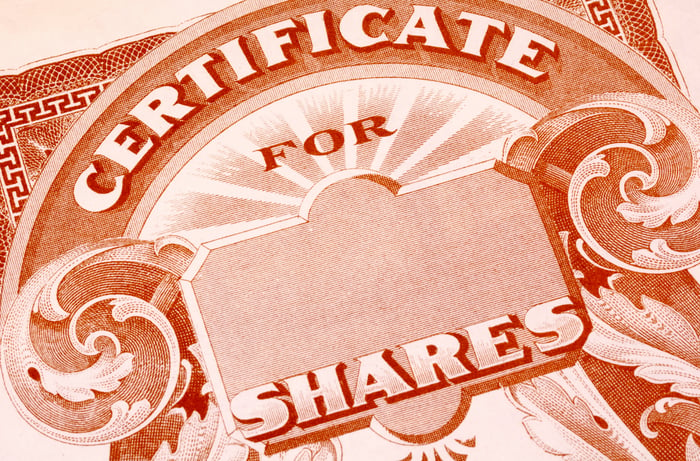This has been an eventful year for Wall Street, with historically high inflation, Russia's invasion of Ukraine, and back-to-back quarters of declining gross domestic product, sending the S&P 500 and Nasdaq Composite firmly into bear market territory during the second quarter.
Yet in spite of this chaos, investors have turned their attention away from the steady stream of bad news and toward stock-split stocks. A stock split is a way for a publicly traded company to alter its share price and outstanding share count without impacting its market cap or operating performance. For example, a forward stock split can lower the share price of a company's stock, which makes it more nominally affordable for retail investors.

Image source: Getty Images.
Stock splits are especially popular given that they're typically enacted by companies firing on all cylinders. After all, a company wouldn't split its stock if it wasn't executing well and hadn't seen its share price head significantly higher.
Since the beginning of the year, a number of widely owned companies have announced and completed a stock split. This includes FAANG stocks Amazon (AMZN -1.64%) and Alphabet (GOOGL 0.55%) (GOOG 0.74%), which each enacted a 20-for-1 forward split, as well as cloud-based e-commerce platform Shopify (SHOP -2.37%), which completed a 10-for-1 stock split.
Within the past year, shares of Amazon, Alphabet, and Shopify were respectively changing hands for north of $3,700, $3,000, and $1,750. Following their respective splits, investors can scoop up a single share of Amazon, Alphabet, and Shopify for about $135, $116, and $35, respectively.
The big question is, which companies are likely to follow in the footsteps of Amazon, Alphabet and Shopify and become the next stock-split stocks that investors obsess over? The answer may lie with one or more of the following four stocks.
Chipotle Mexican Grill
One top-performing stock that looks to be long overdue for a forward stock split is fast-casual restaurant chain Chipotle Mexican Grill (CMG 0.40%). Chipotle debuted via initial public offering at $22/share in 2006 and has proceeded to rocket to $1,564.22/share, as of this past weekend. That's a lot of change investors are having to save up to buy a single share, assuming they can't purchase fractional shares with their online brokerage.
Chipotle's continued outperformance for more than a decade is a reflection of its differentiated approach to ingredients, as well as its ability to shift its operating model to match prevailing economic conditions.
For example, Chipotle has pledged to use meats from animals raised with high welfare standards. The company is also well-known for purchasing locally grown and sourced vegetables. Chipotle finds itself at the center of both a push for higher corporate ethical standards and consumers' desire for healthier food.
As for its ability to adapt, Chipotle has demonstrated incredible pricing power in the face of four-decade high inflation. In addition to passing along hefty price hikes that its customers seem more than willing to absorb, the company has focused on building "Chipotlanes" at most of its new locations. These are drive-thru lanes specifically for people who place their order online or via app. Chipotlanes have been a key growth driver since the pandemic began.

Image source: Getty Images.
Costco Wholesale
Perhaps warehouse club Costco Wholesale (COST 0.17%) is the next stock-split stock to follow in the path of Amazon, Alphabet, and Shopify. Unlike Chipotle, Costco has previously split its shares. However, you have to go back more than 22 years to find that last stock split. As of July 29, 2022, it'll set investors back more than $541 to buy a single share of Costco.
The beauty of Costco's operating model is that it carries nondiscretionary goods. A nondiscretionary good is a product that consumers are going to buy no matter how well or poorly the U.S. economy is performing. Think of toothpaste, toilet paper, paper towels, and food as perfect examples. These nondiscretionary goods help pull shoppers into Costco's stores in any economic environment -- and getting customers in the door is the first step to selling them higher-margin discretionary goods.
Another reason for Costco's success is the company's bulk-buying activity. Purchasing products in large quantities helps the company negotiate a lower per-unit price, which can be passed along to its members. This price advantage makes Costco a popular stop for shoppers.
Costco also reaps rewards from its membership model. Charging members an annual fee generates high-margin revenue in an operating model where margins are usually razor thin. It keeps members exceptionally loyal to the Costco brand as well.
AutoZone
A third highflier that could certainly become the next stock-split stock after Amazon, Alphabet, and Shopify is auto-parts retailer AutoZone (AZO 0.93%). AutoZone hasn't split its stock since April 21, 1994, but has seen its share price soar past $2,100/share. It's the priciest on a per-share basis of the four stocks listed here.
As you can imagine, AutoZone's share price didn't run from $26.25 when it split last in 1994 to more than $2,100 by accident. It's a reflection of changes in consumer vehicle-buying that are clearly favoring parts suppliers. Data from the Bureau of Transportation shows that the average light vehicle has been on America's roads for more than 12 years. With people hanging onto their vehicles for a longer period of time, buying replacement parts and maintenance products has helped boost AutoZone's sales and profits.
The company's distribution network is also somewhat of a marvel. AutoZone relies on more than five dozen mega hubs to supply its smaller stores. A "mega hub" is effectively an AutoZone superstore that carries up to 110,000 different SKU's (stock keeping units). With these larger stores spaced in-between the company's smaller locations, the right part is seemingly always within reach.
Lastly, AutoZone loves to repurchase its common stock, which has undoubtedly helped push its share price higher. Since initiating a share buyback program in fiscal 1998, the company has repurchased $29.1 billion worth of its stock, as of May 7, 2022. In total, more than 152 million shares have been bought back and just 19.6 million remain outstanding.
Broadcom
Finally, semiconductor solutions provider Broadcom (AVGO 0.61%) is a good candidate to become the next sought-after stock-split stock. A single share of Broadcom will have investors reaching for more than $535, as of this past weekend.
The great thing about semiconductor stocks is that they're cyclical. Although recessions are inevitable and semiconductor companies usually see demand drop off during downturns, recessions often last for just a couple of quarters. By comparison, periods of expansion are measured in years and allow a company like Broadcom to bask in the natural expansion of the U.S. and global economy.
Over the next few years, Broadcom's biggest catalyst looks to be the 5G wireless revolution. It's been about a decade since telecom companies last upgraded wireless download speeds. In 2022 and beyond, infrastructure will be upgraded to accommodate 5G wireless download speeds, which should encourage a steady smartphone replacement cycle. Broadcom happens to generate most of its revenue from selling wireless chips and accessories used in next-gen smartphones.
It should also be noted that Broadcom ended the previous year with a record backlog of close to $15 billion. While economic downturns could certainly weigh on near-term chip demand, having a historically high backlog should help Broadcom weather this downturn without adversely impacting its operating cash flow.





